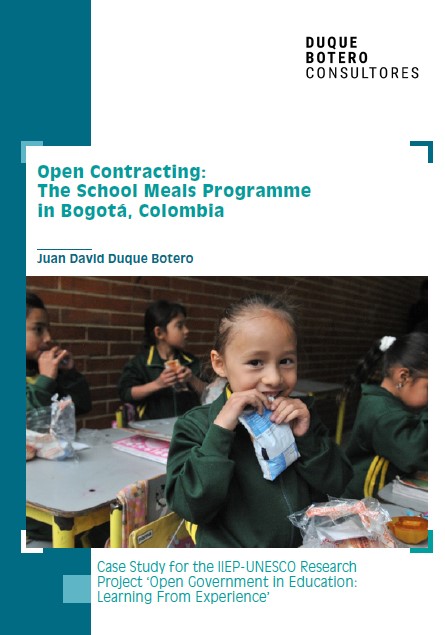Open Contracting: The School Meals Programme in Bogotá, Colombia

The study looks at how an online platform is being used to create greater transparency in public procurement by publishing all documents related to tendering processes in an open and accessible manner. Thanks to this platform, all stakeholders (suppliers, parents, oversight bodies, state bodies, and the general public, among others), are able to follow the contracting processes for the sourcing of food and delivery of school meals in Bogotá. This example illustrates how such a model allows for proper monitoring and oversight of food quality across the entire chain.
The Department of Education in the Capital District of Bogotá and the Colombian National Public Procurement Agency have also used an open data system to analyse past and current SMP tenders in Bogotá and identify the main issues to be tackled.
Effective market analysis led to a decision to cut out intermediaries by splitting the operation in two: sourcing food on the one hand, and logistics operations (storing, packing, and delivering meals) on the other.
The SMP Open Contracting Initiative helped strengthen the procurement process and operation in Bogotá, leading to greater monitoring by overseers and the SMP central team, from food sourcing and logistics operations to final delivery of meals to the children and young people at all the DEIs in both rural and urban areas.
The research suggests that despite the notable success of the SMP Open Contracting Initiative in Bogotá, rolling this programme out nationwide will not be an easy task. Although procurement processes across the country could certainly be published on e-procurement platforms such as SECOP, the model would need to be adjusted to the specific requirements of each particular region. For example, while the Capital District uses processed foods in school meals, most schools in Colombia prepare their meals on site. Therefore, it will be necessary to analyse the operational structures in each area to see how the range of suppliers might be increased in each and every procurement process.
The study concludes on the importance of greater involvement of programme beneficiaries, in particular students, teachers, and parents. It further recommends that increased efforts are made to ensure that citizens who take the time to make suggestions for improvement are given feedback on any impact or changes that have come about as the result of their comments.
Selected Recommendations
- Create strategies to encourage increased feedback from programme beneficiaries.
- Improve training in the public procurement system and the strategic supply models that now form part of the procurement process and are at the heart of all the DAIs
- Increase awareness of and access to information for actors and participants involved in the SMP Open Contracting Initiative through improved availability and proper monitoring and oversight
- Pay greater attention to specific conditions in the country’s different regions, departments, and municipalities
Want to learn more?
To share these recommendations and discuss major findings of the case study with relevant stakeholders including researchers, decision-makers, public officials and civil society representatives, the IIEP hosted a launch webinar together with Duque Botero Consultores on Wednesday, 26 May 2021. Download the flyer in Spanish

About the Author
Juan David Duque Botero has been Director General of Colombia Compra Eficiente, General Secretary of the Colombian Ministry of Information and Communication Technologies, General Secretary of the Office of the Superintendent of Trade and Industry, magistrate judge for the Third Chamber of the Council of State, Deputy Secretary for Planning in the Capital District of Bogotá, and Head of the Legal Department at the Colombian Ministry of Foreign Affairs.
This is one of the six case studies on open government initiatives commissioned by IIEP and also conducted in India, Madagascar, Peru, Portugal, and Ukraine. It is part of the IIEP’s overarching research on ‘Open government: Learning from experience’.



